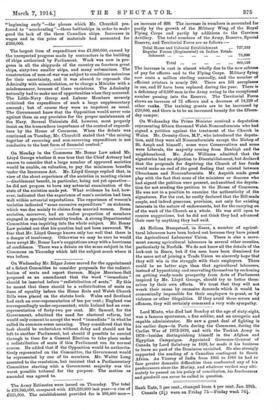The largest item of expenditure was £1,000,000, caused by the
unexpected progress made by contractors in the building of ships authorized by Parliament. Work was now in pro- grew; in all the shipyards of the country on fourteen great ships, sixty-two smaller ships, and many submarines. The construction of men-of-war was subject to conditions notorious for their uncertainty, and it was absurd to reproach the Admiralty with miscalculation, or to charge a Minister with a misdemeanour, because of these variations. The Admiralty naturally bad to make use of opportunities when they occurred. The Little-Navy Group and Labour Members severely criticized the expenditure of such a large supplementary amount ; but of course they were as impotent as usual. The Government knew that the Opposition would never vote against them on any provision for the proper maintenance of the Navy. Several Unionists did, however, most properly insist on the tremendous importance of the control of expendi- ture by the House of Commons. When the debate was continued on Tuesday, Mr. Churchill stated that "the mixing together of recurring and non-recnrring expenditure is not conducive to the best form of financial control."














































 Previous page
Previous page